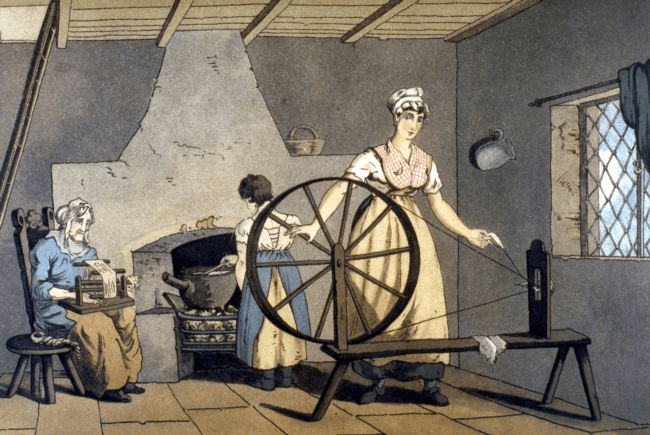What country was the first to industrialize?
Great Britain
People start moving into cities in a process called___________.
Urbanization
This natural resource, in ample supply in England powered steam engines.
What is coal?
In the early days of the Industrial Revolution, many factories were built along rivers because:
Water power was used to power factory machines.
What ENDURING ISSUE applies to the Industrial Revolution?
EXPLAIN IN YOUR OWN WORDS.
Who is the founder of Capitalism?
Adam Smith
List 3 cons of communism:
- no private ownership
- decrease in production
- limited freedom
- government corruption
This factory is where clothing was produced.
What is the textile factories?
This form of protest was used to fight for better working conditions
What is a strike?
An extreme shortage of food is called a ___________________.
Famine
Name two causes that allowed Great Britain to industrialize
Land--Lots of Resources
Labor--Population Increase
Political Stability--Avoided Wars
Capital--Free Market, etc.
List 3 benefits of industrialization:
- creation of middle class
- increase in jobs
- more affordable products
- urbanization
a member of the working class
proletariat
Karl Marx is considered the Father of which of the following?
What is Communism?
EXPLAIN IN YOUR OWN WORDS.
Name two negative effects of industrialization.
Pollution, crime, disease, over crowding, tenements, poor living conditions, poor sanitation
List two of the poor working and living conditions that many suffered moving into cities and working in factories.
Long Hours; Low Wages; Dangerous Working Conditions, Child Labor, etc.
These were created to increase rate of production.
What is a factory?
What was an immediate result of the mass starvation in Ireland in the late 1840s?
Migration of many Irish to other countries
What was the purpose of labor unions?
To protect the rights of the workers.
What event paved the way for the Industrial Revolution?
Agriculture Revolution
What lessons can be learned from the Irish Potato Famine in terms of agricultural practices and food security? THINK OF SOLUTIONS
Diversifying crops and agricultural practices
Why was child labor allowed in the 1800s?
- children were needed to help provide for their families
- it was easy to take advantage of children
- children were able to maneuver into small spaces
A policy that let owners of industry set working conditions without government interference.
What is the laissez-faire policy?
According to Karl Marx, this social class is to blame for the suffering of the poor.
What is the bourgeoisie?
Why is communism appealing to the poor?
- it eliminates competition and social classes
What was a benefit of the railroad in Britain?
It offered cheap transportation for materials and goods.
What measures did the British government take in response to the Irish Potato Famine?
Implemented workhouses, soup kitchens, and public works projects
Who defended the free-market system of capitalism in the book, The Wealth of Nations?
Who is Adam Smith?
 Prior to the first British Industrial Revolution, which industry dominated Britain?
Prior to the first British Industrial Revolution, which industry dominated Britain?
Cottage Industry/ Domestic System
Author(s);
"Communist Manifesto"
Karl Marx and Fredrich Engels
Groups created to fight for workers rights.
What is Unions?
Social class made up of skilled workers, professionals, business people, and wealthy farmers.
What is Middle Class?
What is blight?
A plant disease caused by a fungus
Which group of people benefited the most from the Industrial Revolution?
Bourgeoisie